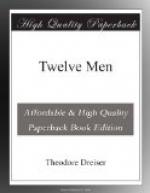“But, Paul,” I insisted on another occasion when he had just wired twenty-five dollars somewhere to help bury some one. (My spirit was not so niggardly as fearsome. I was constantly terrified in those days by the thought of a poverty-stricken old age for myself and him—why, I don’t know. I was by no means incompetent.) “Why don’t you save your money? Why should you give it to every Tom, Dick and Harry that asks you? You’re not a charity organization, and you’re not called upon to feed and clothe and bury all the wasters who happen to cross your path. If you were down and out how many do you suppose would help you?”
“Well, you know,” and his voice and manner were largely those of mother, the same wonder, the same wistfulness and sweetness, the same bubbling charity and tenderness of heart, “I can’t say I haven’t got it, can I?” He was at the height of his success at the time. “And anyhow, what’s the use being so hard on people? We’re all likely to get that way. You don’t know what pulls people down sometimes—not wasting always. It’s thoughtlessness, or trying to be happy. Remember how poor we were and how mamma and papa used to worry.” Often these references to mother or father or their difficulties would bring tears to his eyes. “I can’t stand to see people suffer, that’s all, not if I have anything,” and his eyes glowed sweetly. “And, after all,” he added apologetically, “the little I give isn’t much. They don’t get so much out of me. They don’t come to me every day.”
Another time—one Christmas Eve it was, when I was comparatively new to New York (my second or third year), I was a little uncertain what to do, having no connections outside of Paul and two sisters, one of whom was then out of the city. The other, owing to various difficulties of her own and a temporary estrangement from us—more our fault than hers—was therefore not available. The rather drab state into which she had allowed her marital affections to lead her was the main reason that kept us apart. At any rate I felt that I could not, or rather would not, go there. At the same time, owing to some difficulty or irritation with the publishing house of which my brother was then part owner (it was publishing the magazine which I was editing), we twain were also estranged, nothing very deep really—a temporary feeling of distance and indifference.
So I had no place to go except to my room, which was in a poor part of the town, or out to dine where best I might—some moderate-priced hotel, was my thought. I had not seen my brother in three or four days, but after I had strolled a block or two up Broadway I encountered him. I have always thought that he had kept an eye on me and had really followed me; was looking, in short, to see what I would do As usual he was most smartly and comfortably dressed.
“Where you going, Thee?” he called cheerfully.
“Oh, no place in particular,” I replied rather suavely, I presume. “Just going up the street.”




